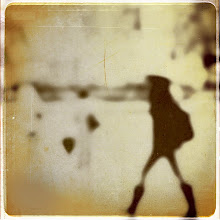There
isn’t a word for walking out of the grocery store
with a gallon jug of milk in a plastic sack
that should have been bagged in double layers
with a gallon jug of milk in a plastic sack
that should have been bagged in double layers
—so
that before you are even out the door
you feel the weight of the jug dragging
the bag down, stretching the thin
you feel the weight of the jug dragging
the bag down, stretching the thin
plastic
handles longer and longer
and you know it’s only a matter of time until
bottom suddenly splits.
and you know it’s only a matter of time until
bottom suddenly splits.
There
is no single, unimpeachable word
for that vague sensation of something
moving away from you
for that vague sensation of something
moving away from you
as
it exceeds its elastic capacity
—which is too bad, because that is the word
I would like to use to describe standing on the street
—which is too bad, because that is the word
I would like to use to describe standing on the street
chatting
with an old friend
as the awareness grows in me that he is
no longer a friend, but only an acquaintance,
as the awareness grows in me that he is
no longer a friend, but only an acquaintance,
a
person with whom I never made the effort—
until this moment, when as we say goodbye
I think we share a feeling of relief,
until this moment, when as we say goodbye
I think we share a feeling of relief,
a
recognition that we have reached
the end of a pretense,
though to tell the truth
the end of a pretense,
though to tell the truth
what
I already am thinking about
is my gratitude for language—
how it will stretch just so much and no farther;
is my gratitude for language—
how it will stretch just so much and no farther;
how
there are some holes it will not cover up;
how it will move, if not inside, then
around the circumference of almost anything—
how it will move, if not inside, then
around the circumference of almost anything—
how,
over the years, it has given me
back all the hours and days, all the
plodding love and faith, all the
back all the hours and days, all the
plodding love and faith, all the
misunderstandings
and secrets
I have willingly poured into it.
I have willingly poured into it.
Tony
Hoagland








